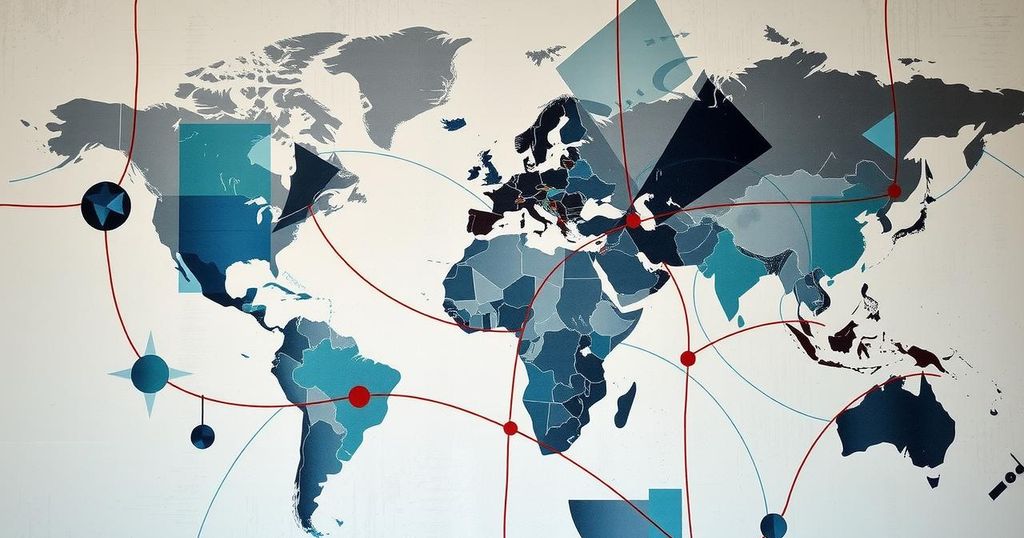Examining the Russia-Houthi Relationship: A Challenge for US Policy in Yemen
President Trump’s airstrikes against Yemen’s Houthi rebels highlight Iran’s support for the group but also acknowledge Russia’s crucial role. Reports indicate that Russia provides targeting data to the Houthis while negotiating weapons transfers. The relationship is mutually beneficial, with the Houthis supplying recruits to Russia. Increasing cooperation between US adversaries poses a threat to US maritime interests, necessitating a firmer US response against the Kremlin.
On March 15, 2025, President Donald Trump ordered substantial airstrikes against Yemen’s Houthi rebels as a reaction to their attacks on Red Sea shipping. The Houthis, an Iranian-backed group controlling major areas of Yemen, have executed numerous strikes on vessels since November 2023, resulting in significant disruptions to global maritime trade.
President Trump pointedly noted on his Truth Social account that Iran funds the Houthis, stating, “Funded by Iran, the Houthi thugs have fired missiles at US aircraft, and targeted our Troops and Allies.” He reiterated that Iran would be accountable for any future Houthi aggressions, emphasizing, “Every shot fired by the Houthis will be looked upon… as being a shot fired from the weapons and leadership of IRAN.”
While Iran’s involvement is evident, it is crucial to recognize Russia’s role as a significant supporter of the Houthis. Reports from the Wall Street Journal in October 2024 indicated that Russia was supplying the Houthis with valuable targeting data for their assaults on Western shipping. This involvement includes the operations of the GRU, Russia’s primary intelligence agency, which engages in technical aid within Houthi-controlled areas.
Additionally, Russia has reportedly engaged in negotiations regarding arms transfers to the Houthis. In the fall of 2024, Russian arms dealer Viktor Bout reportedly sought to negotiate the sale of automatic small arms worth ten million dollars to the group. Iran allegedly facilitated secret discussions for the transfer of anti-ship missiles, which would enhance the Houthis’ capabilities to threaten US and European vessels.
The cooperation is reciprocal; by summer 2024, the Houthis had supplied Russia with hundreds of Yemeni individuals, misled into believing they were signing up for construction jobs, who were instead conscripted into Russian military training. This assistance has provided Russia with additional manpower amid its prolonged conflict in Ukraine while granting Houthi fighters safe passage for their operations in the Red Sea.
This developing interaction between Moscow and the Houthis signals a shift in Russian policy towards Yemen. Initially adopting a neutral stance during the Yemen civil war that began in 2011, Russia has increasingly engaged with Houthi representatives, indicating a focused interest in their operations.
This collaboration should be viewed as part of a broader strategy among US adversaries to counter Western influence in the Middle East, simultaneously reinforcing the ties between Tehran and Moscow. Russian support empowers the Houthis to destabilize the Red Sea, exacerbating pressures for the United States and its partners, while furthering a shared goal of a multipolar global order.
As tensions rise, the United States should remain vigilant regarding Russia’s involvement and related Houthi operations that threaten maritime security. The US has already expended over one billion dollars in response to Houthi actions that impede shipping through critical global trade routes. Simultaneously, Russian assistance compounds these issues to challenge US interests further.
It is imperative for the Trump administration to adopt a firmer stance against the Kremlin rather than concede further. Recent discussions have indicated concessions regarding US support for Russia’s grain market and potential premature agreements regarding Ukraine’s NATO prospects. Ignoring Russia’s collaboration with the Houthis could lead to significant misunderstandings about Moscow’s international intentions.
In conclusion, as the United States navigates its foreign policy in the region, recognizing the multifaceted threat posed by both Iran and Russia in Yemen is crucial. The current moment necessitates strategic pressure against the Kremlin, rather than unwarranted concessions, to safeguard maritime interests and regional stability.
In summary, the escalating collaboration between Russia and the Houthis underscores a critical geopolitical challenge for the United States. Recognizing both Iran and Russia’s roles in supporting the Houthis is essential for formulating effective strategies that protect US interests. The imperative for the Trump administration is to exert pressure on Moscow, counteracting any tendencies toward appeasement, ensuring sustained attention to the complexities of the Houthi threat in the context of global maritime security.
Original Source: www.atlanticcouncil.org








Post Comment